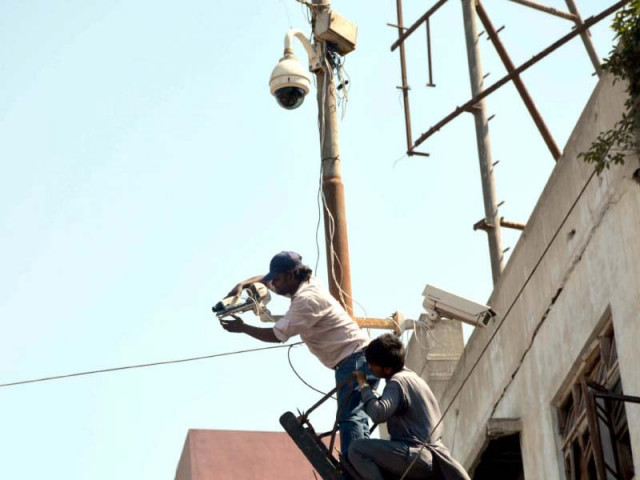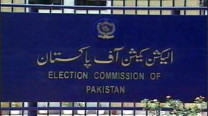Karachi law and order Centre, province need to come on same page: SC
Federal govt refuses to give geo-fencing facility to Sindh, AG tells apex court

A man fixing a CCTV camera in Saddar during Muharram last year. PHOTO: FILE
SC’s five-judge bench, headed by Chief Justice of Pakistan Anwar Zaheer Jamali and comprising justices Amir Hani Muslim, Mushir Alam, Faisal Arab and Khilji Arif Hussain, was hearing the case on the implementation of the judgment passed in Karachi law and order suo motu case at SC’s Karachi Registry.
The remarks came when the bench was told that the federal government declined to extend geo-fencing facility to Sindh Police, despite the IG’s request. Meanwhile, the Sindh government failed to install high-quality security cameras in Karachi and hampered fresh recruitments in the police force under the garb of a ban. The judges ordered the provision of 3G and 4G locators to the police, immediate installation of high-quality closed-circuit television (CCTV) cameras and starting the process of fresh recruitments in the police.
At the outset of the hearing, attorney general (AG) Ashtar Ausaf Ali said the relevant federal authorities had no objection to Sindh IG AD Khawaja’s demand for provision of geo-fencing and 3G and 4G locators to the police. He opposed, however, the IG’s demand to give the police access to geo-fencing - the facility is only accessible to intelligence agencies for now. The information will be provided to the Sindh police within 24 hours of the request and within two hours for important cases, he said.
The bench also questioned why the interior ministry notification directing cellular companies to share data with the police immediately has yet to be implemented. The IG informed that in the recent kidnapping of Barrister Ovais Shah, the cellular company shared data 14 days after asking the police to approach them through the intelligence agency. Justice Hussain noted that police have become a provincial subject and should have the required facilities.
Expressing dismay over what they called was mistrust among state institutions and agencies, the bench noted that it was the prime duty of the government to ensure protection to the lives and property of the citizens. Who will perform such duties when the state institutions start pointing fingers at each other, it asked.
The apex court also ordered the prisons IG to submit a list of all those prisoners who were either released on parole or had absconded from jails by the next hearing.
Action against police officers
The SC also directed the AG to file a report of the establishment secretary on action initiated against senior police officers over their negligence on the day Barrister Shah was kidnapped. IG Khwaja said that South DIG Munir Sheikh has been appointed as inquiry officer to investigate the negligence and assured the report will be filed within one week.
CCTV cameras system
The judges were visibly irked when the provincial chief secretary disclosed that only 17, out of a total of 820 CCTV cameras installed in Karachi at a cost of Rs500 million, were functional at the moment.
According to the chief secretary, the cameras had a resolution of two-megapixels and needed to be upgraded to at least three-megapixels. He claimed that money to buy the cameras was given to the IG, who pointed out that the funds were meant to procure transportation and arms only. He suggested the government to purchase the cameras by itself and run them through a private company as the police lacked the technical expertise.
Justice Hussain wanted to know why Rs12 billion were spent to install CCTV cameras in Islamabad’s Safe City Project but no such funds were allocated for Karachi. “Is there any difference in blood between the people of Islamabad and Karachi?” asked the visibly irked judge.
The bench reprimanded the chief secretary for making a wrong statement and directed him to find out how much money the provincial government was allocating for CCTV cameras and when the project was going to be executed. The IT department in Sindh has failed to develop a facial recognition software of suspects for the police, the judges noted.
“People have been dying in Karachi for the last five years but the Sindh government has not taken a single concrete decision to control the law and order situation,” noted Justice Hani, warning that those involved in buying poor quality CCTV cameras will not be allowed to escape.
Police recruitments
The IG told the bench that there are nearly 20,000 vacancies in the police but the recruitment drive could not be started due to a ban on fresh appointments placed by the previous government. The chief secretary failed to explain why the recruitments in the police force were banned despite court directives.
The SC bench ordered the IG to start the recruitments immediately and complete them in a ‘transparent’ manner. The hearing was adjourned till August 11.
Published in The Express Tribune, July 29th, 2016.


















COMMENTS
Comments are moderated and generally will be posted if they are on-topic and not abusive.
For more information, please see our Comments FAQ